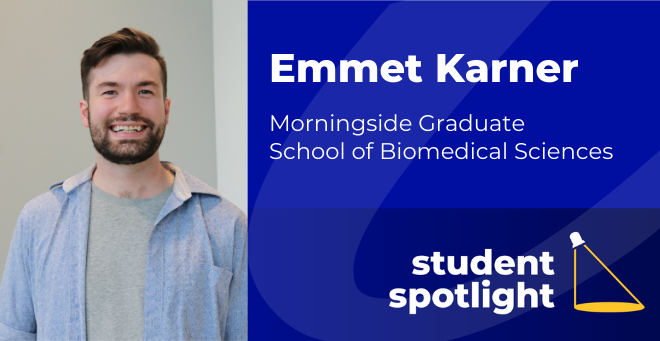PhD candidate Lucas Restrepo tackles involuntary movement disorders by mutating fruit fly genes to study the process of mitophagy, the process where the cell breaks down and eliminates toxic mitochondria, and strums the banjo in his spare time.
Growing up with three brothers in Chester Springs, Pennsylvania, Restrepo intended to play football in college and become a physical therapist. He ended up majoring in biology at The Catholic University of America, where he joined a lab and was introduced to the wonders of biomedical research.
“I’ve always liked visual science,” said Restrepo. “As a kid, I had issues with my eyes and had to wear glasses, so being able to work with microscopes is special to me. It’s a blessing to see things with the help of advanced tools and techniques that can’t be seen with the naked eye. I feel like I’m more of an artist than a scientist sometimes when I’m taking images of cells.”
Before joining the lab of Eric Baehrecke, PhD, the Our Danny Cancer Fund Chair in Biomedical Research II and professor of molecular, cell & cancer biology, Restrepo worked as a research associate at two Pennsylvania labs. In the Morningside Graduate School of Biomedical Sciences’ Interdisciplinary Graduate Program, Restrepo uses fruit fly genetic techniques coupled with high-resolution microscopy to study mitophagy. Two of the mutated genes associated with Parkinson’s disease, a brain disorder that causes uncontrollable movements and eventually hampers the ability to walk or talk, are regulators of mitochondrial quality control.
“A lot of diseases can be recapitulated in flies; for example, Parkinson’s,” said Restrepo. “When we knock out genes mutated in Parkinson’s disease, we see phenotypes like motor discoordination and tremors manifest in the fruit fly. It’s a powerful model for understanding genetic changes and studying multiple genes at once, which helps in understanding how these genes point toward pathologies.”
In addition to his work in the lab, Restrepo takes advantage of opportunities to share his love of science. He presented his research to the campus community during January’s Unsolved Pathologies Coffee House, helps students at Wachusett High School conduct their own fly experiments and virtually educates students in classrooms around the country through a nonprofit called Skype a Scientist.
Restrepo picked up the banjo in 2021, on the advice of fellow PhD candidate Emmet Karner.
“Just like in science, you sort of just see your musical progress advance exponentially,” Restrepo said.
The Student Spotlight series features UMass Chan Medical School students in the Morningside Graduate School of Biomedical Sciences, Tan Chingfen Graduate School of Nursing and T.H. Chan School of Medicine. For more information about UMass Chan Medical School and how to apply, visit the Prospective Students page.

